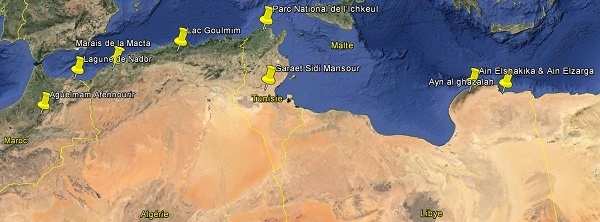Main partners of the projectWaterbirds and wetlands in the Mediterranean regionMonitoring of waterbirds in North Africa for the conservation of wetland areaThe support groupsAdapting to the intrinsic differences between North African countriesFor further information
Main partners of the project🠉
From June 2013 to October 2016, the Tour du Valat coordinated a capacity builfing project for waterbird monitoring and wetland management in the Mediterranean region, in cooperation with the Research Group for Bird Protection (GREPOM – Morocco), the "Friends of Birds" Association (AAO - Tunisia), the Algerian National Association of Ornithology (ANAO - Algeria) and the Libyan Society for Birds (LSB – Libya).
This project was funded by the Critical Ecosystem Partnership Fund (CEPF) which is a joint initiative of the Agence Française de Développement (AFD), Conservation International, the European Union, the Global Environment Facility (GEF), the Government of Japan, the MacArthur Foundation and the World Bank. A fundamental goal of the initiative is to ensure civil society is engaged in biodiversity conservation.

Waterbirds and wetlands in the Mediterranean region🠉
The Mediterranean region is extremely rich in biodiversity. Among the most remarkable ecosystems, wetlands are home to a great diversity of species. This ecosystem is also among the most threatened in the world, mainly due to the recent and continued growth of human populations and the joint development of irrigated agriculture, urbanization, industry, transport infrastructure and tourism. Waterbirds (ducks, geese, herons, gulls, terns, etc.) are an important component of the Mediterranean wetlands. Their diversity, abundance and migration habits are important for many of our cultural values and human social practices. These species are since long time subject of monitoring, helping to evaluate the value and health of wetlands ecosystems. Waterbirds are also an excellent way to raise awareness and mobilize civil society for their conservation and beyond, ecosystems on which they depend.
Monitoring of waterbirds in North Africa for the conservation of wetland area🠉
This project aimed to improve wetland conservation and management in the Mediterranean region by developing waterbird monitoring in partnership with local stakeholders. During the project, both professionals and volunteers were trained on waterbird monitoring and waterbird censuses, as well as on the important ecological roles of wetlands.
The first objective was to strengthen the monitoring activities of waterbirds in North Africa (particularly in Algeria, Libya, Morocco and Tunisia) by implementing or reinforcing monitoring programmes at 8 test-sites (2 per country, see the map below) and by involving local stakeholders at these sites (site manager, local environmental NGOs, agricultural development group, cooperatives, administration, etc.).
The second objective was to use results of such monitoring to manage and conserve target waterbird species and their habitats by developing ornithological indicators.
The final objective was to reinforce the regional cooperation by exchanging expertise and experiences during regional workshops.

Location of the 8 test-sites (source: google earth)
By improving skills and awareness of private site managers, civil society and the authorities responsible for the management of sites and national public policies on wetlands on waterbird monitoring, the aim was to achieve better management and conservation of these key biodiversity sites, seriously threatened.
The support groups🠉
In order to achieve these objectives, the first step was to create a “support group” (made up of site managers, local NGOs, local communities, local administrations, universities interested in biodiversity) at each test-site to support and influence management of their respective sites. On a second step, members of these support groups received theoretical and practical training in the identification of waterbirds and their monitoring on the one hand and in site management on the other hand. Joint monitoring activities were also implemented at each test-site to improve knowledge of the sites (e.g. abundance and spatial distribution of breeding, migrating and wintering waterbirds, wetland conservation status, etc.). Results of this monitoring were used to build ornithological indicators to influence wetland conservation at local scale.
Adapting to the intrinsic differences between North African countries🠉
Although North Africa is a single geographic entity characterized by the influence of common climatic factors, the development of the national civil society is different according to the national approaches. It exists in North Africa a disparity in the levels of knowledge and management and conservation of waterbirds and wetlands, as well as in the organization of associative life for both civil society and government. The framework of activities was therefore common to the 4 countries involved but was specifically adapted to each country by each NGO responsible of the implementation of this project (AAO, ANAO, GREPOM and LSB) concerning the content of training and capacity-building activities to suit the local situation. Tour de Valat, as regional coordinator, gave continuous support and advices to these national NGOs.
For further information🠉
For more information, you can watch the following video and listen to the testimonials of the project volunteers for each partner country.
You can also download the first technical report of the project (only available in French) from the period July-December 2013.






